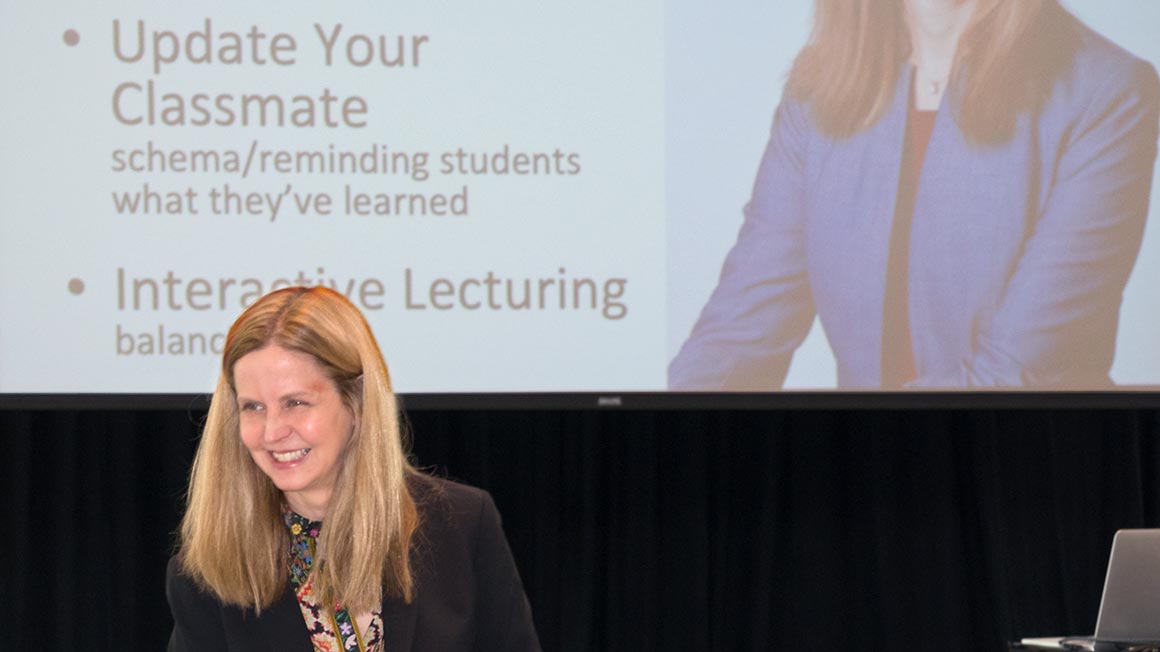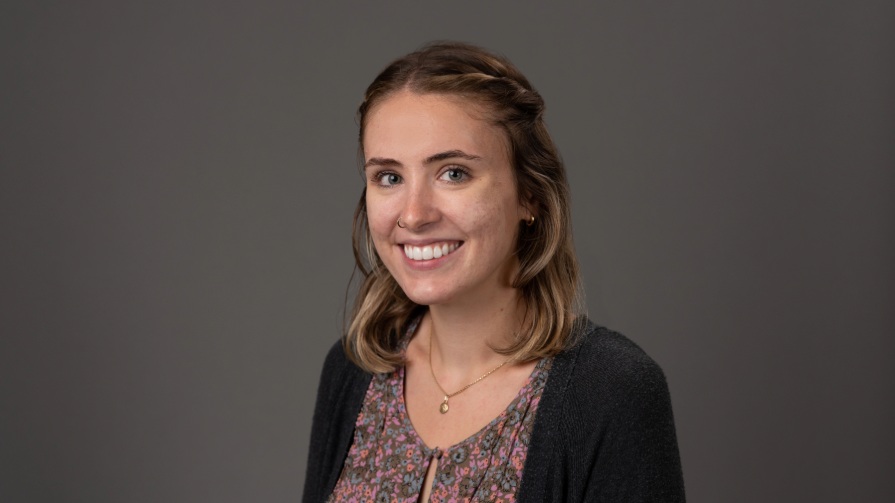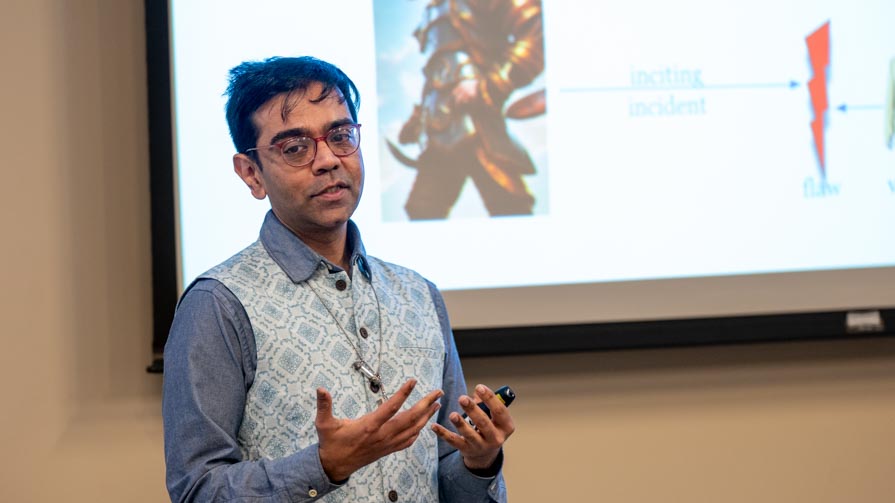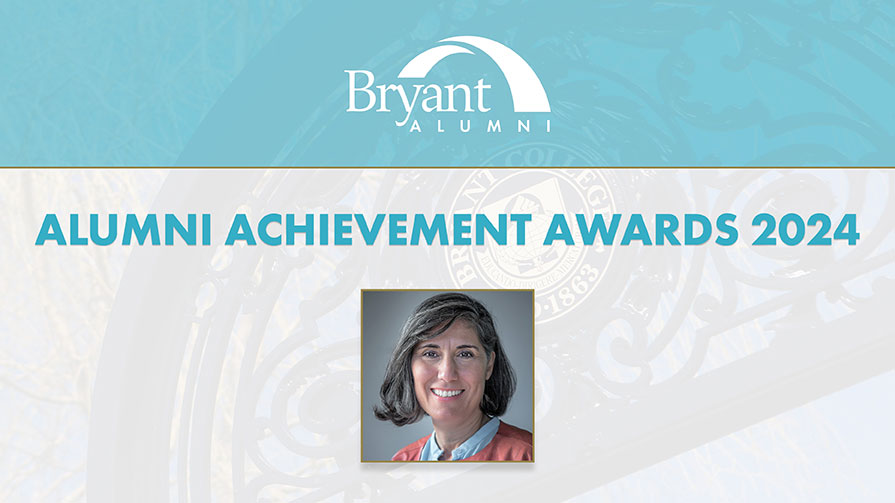At the second annual Summit on Teaching and Learning, Bryant faculty and leaders gathered to develop and iterate curricula, pedagogies, and delivery systems to enhance teaching effectiveness.
The Summit is an opportunity for faculty in different disciplines to exchange ideas, collaborate, and maintain a vibrant teaching climate.
According to Edward Kairiss, Director of Faculty Development and Innovation, the Summit is an opportunity for faculty in different disciplines to exchange ideas, collaborate, and maintain a vibrant teaching climate. Kairiss spearheaded the creation and development of the Summit and continues to enhance the program each year based on the latest teaching and learning trends.
Bryant’s dedication to teaching excellence and innovation is one reason why Rick Gorvett, Ph.D., joined the University last fall. “Teaching innovation is, to an impressive degree, simply a standard part of what Bryant faculty do,” said Gorvett, who is Professor and Chair of Bryant’s Mathematics Department. “The time and attention given to effective teaching here at Bryant is both impressive and unusual.”
Engaging students in the learning process
At the day-long conference, keynote presentations, workshops, and roundtables focused on answering one question: How to motivate students to actively participate in the learning process. With decades of experience in higher education and consulting, Claire Howell Major, Ph.D., Professor of Higher Education at the University of Alabama, and Emory Craig, Director of eLearning at the College of New Rochelle, served as the Summit’s keynote speakers.
According to Major, recent research on motivation and learning indicates that for students to be successful, they must value learning, expect to succeed, and be active participants in their learning. The award-winning educator and author presented detailed strategies for creating a course that links the cognitive effort and emotional investment to foster sustained attention and elicit a students’ best work.
Emory Craig provided a look into virtual and augmented reality, and how these technologies can be applied in a number of educational disciplines including literature, biology, medical training, 3D visualization, and even climate simulation.
“This is an emerging and fascinating technology that will transform learning and increase student engagement.”
According to Suhong Li, Ph.D., Professor and Chair of the Department of Information Systems and Analytics, “This is an emerging and fascinating technology that will transform learning and increase student engagement.”
Faculty Presenters
In addition to the keynote presentations, several faculty and staff members presented best practices and research findings.
The ABCs of Grading at Bryant: a broad discussion on grading practices, philosophies, and their relationship to student learning, presented by:
- Robert Jones, Director of Strategic Planning and Research
- Edward Kairiss, Director of Faculty Development and Innovation
- John Dietrich, Ph.D., Professor of History and Social Sciences
Online Teaching the Bryant Way: a presentation on the pedagogies and instructional design practices behind Bryant’s online Professional MBA program, presented by:
- Bonnie Budd, Ed.D., Director of Online Learning
Difficult Classroom Conversations: a presentation and discussion on some possible challenges students may encounter on campus, presented by:
- Kevin Martins, Ph.D., Special Assistant to the President for Inclusive Excellence and Director for the PwC Center for Diversity and Inclusion
- Judith McDonnell, Ph.D., Professor of History and Social Sciences
Innovation applied beyond the classroom
Professor Gorvett, one of the nation’s top actuarial scientists and risk analytics experts, innovates his classroom by relating mathematics into the broader range of knowledge and experiences in a career. “I aim to create interdisciplinary, interactive projects and case studies that mimic both real-world-type applications and the group-based approach to finding solutions.”
“Such innovations can be difficult to introduce in a Mathematics course, where they are sometimes resisted by students who have grown up with, and are comfortable in, a lecture-style classroom format,” added Gorvett.
Professor Li, the 2017 Computer Educator of the Year and recipient of the 2017-2018 Faculty Innovation Grant, incorporates cutting-edge technology into the Information Systems and Analytics curriculum, to remain current and relevant in today’s job markets.. “In my Big Data Analytics class, students learn how to extract, transform, load, analyze, and visualize Fitbit data using Apache Spark,” she noted. “Student engagement is generated through their analysis of data, which is immediately relevant to their daily activities.”






